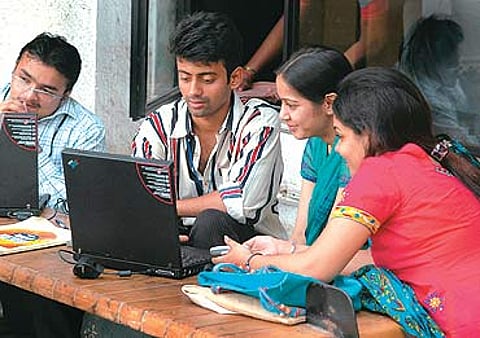Matchstick Managers
Is the CAT system really zeroing in on our best talent?
While Ananth’s observation was based on the Joint Entrance Examination (JEE) for the IITs, it applies equally to the Combined Admission Test (CAT) and other tests conducted for entry into India’s premier management institutes. Here too, experts and management gurus have started expressing reservations about the methods used/skills tested by these examinations.
There’s obviously a lot at stake. Over the years, the CAT has emerged as one of the country’s most intensely contested battlefields. Today, it serves as the entrance examination for not just the six IIMs, but a number of other big-ticket B-schools like the SP Jain Institute of Management, Mumbai; Institute of Management Technology (IMT), Ghaziabad; Management Development Institute (MDI), Gurgaon; Mudra Institute of Communication, Ahmedabad (MICA); National Institute of Industrial Engineering (NITIE), Mumbai, and so on.
Last year, close to 2,50,000 aspirants appeared for CAT—expect that number to go up considerably this year. Moreover, the debate over CAT applies to other B-school entrance tests as well. For instance, there are the Xavier Admissions Test (XAT)—which has 43 affiliate B-schools, the Management Aptitude Test (MAT) as well as a slew of state entrance tests for various management institutions. Most of these use similar methods to test candidates.
What then are the complaints against the current system of testing? For one, there is a clear feeling that it lacks in testing social values, considered important today. Says management guru Mrityunjaya B. Athreya, "The B-schools have gone too far towards the objective-type examinations and there is a general decline in language and communications skills. These are important for management. There is also not enough stress on the general skills and knowledge required in this kind of work." He goes on to add that while business is gradually stepping up its exposure to corporate social responsibility (CSR), that spirit is not visible in management entrance examinations. "It is not enough to produce technicians and engineers. We need holistic people," says Athreya.
The view finds an echo with MDI Gurgaon’s Dr Pritam Singh, a management education veteran and former director, IIM, Lucknow. "The whole examination system and how we select students should be re-examined. It does not groom leaders. Even Mahatma Gandhi, were he to take the CAT, would have failed," he says. In Singh’s view, one of the CAT’s major drawbacks was its overemphasis on testing and measuring a person’s cognitive powers, while in real life situations, the emotive component played a more important role. This, he felt, was needed to bring in more pragmatic leaders into the IIMs and other business schools and, through them, to the Indian business environment.
At present, most students undergo the intense training not to face India’s business environment, but to clear the exams. Says Ananth of IIT Madras: "There are students coming here who have never seen a lab before. There is a feeling among them that the ends justify the means."
Experts also argue that while in the West all management schools insist on corporate exposure before admitting a student into B-school, in India, we take greenhorns. While this has now begun to change in some B-schools, by and large Indian MBAs require another round of training once they join an organisation. So these exams, which should be based on social values and current affairs, merely become an academic exercise, distant from practical realities. Says Ananth: "Management education should come 10 years after one is employed. The exams should be held then to check the actual skills of students."

Obviously, the IIMs look at it differently. Says former IIM Ahmedabad director Bakul Dholakia: "There are no serious issues over credibility. The basic format of CAT and GMAT is similar...and it has been followed for the last 30 years. The challenge is to test the intellect of the candidate. So, while the attributes of the test will not change, the methods will." The IIMs feel there is no need to change the CAT format because there is a built-in element of surprise every year to keep in pace with the times.
Athreya, however, differs and feels B-schools should outsource parts of the examination to different agencies and just monitor the exercise to ensure the tests meet the objectives. This way, he feels, the schools would be spared from the logistics of the examination and can devote time to design them in a more relevant manner. To make the admissions process more relevant, some American schools are working on abandoning the GMAT—the examination for entrance to management schools there—and moving to a new system where application writing, attachment of credentials and recommendations from relevant people are considered to select the right people.
So, what should be the way forward for the CAT? Athreya feels the IIMs should include psychometric tests to test overall skills. MDI’s Singh too feels that not just IQ but other elements like social and emotional quotient should figure in management entrance examinations. There is also the opinion that the case study method currently followed for the CAT can lead to effective problem-solving but does not groom leadership. To address this, global leaders like Wharton, Harvard and Kellogg are actively looking at outbound methods like theatre and public speaking as part of their selection process.
Of course, the IIMs are also looking at change—they are moving from a paper-based examination to an online mode, more in line with the system followed for GMAT. Says Dholakia: "We are projecting a situation where 3,00,000 people will take the examination." While the CAT has not attained global status yet, this could be the first step to align it with an international examination system. But a more drastic recipe is the need of the hour. An examination system that is, well, thoroughly re-examined to choose the right kind of people that go into India’s top business schools. These are the very managers, after all, who will be tomorrow’s entrepreneurs and will one day run India’s corporate sector. We need to choose carefully.
Tags